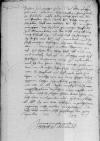Es haben etliche hern von den vornhemsten dyser lande ko(niglich)e rethe uns geschryben, / daß wir wolthen ⌊ko(nigliche)r m(ajeste)t⌋, u(nserem) a(llergnedigsten) hern, antzeygen, / wy dy stelle gewonther ⌊thagfarth⌋ zcu ⌊Marienburg⌋ mit der lufft vorgifftung noch behafft sey, / so auch, daß dy jennigen, dy do hin von ⌊ko(nigliche)r m(ajeste)t⌋ vorordnet, / und dy sloßrenthen befolhen, / sich von dannen begeben, / derwegen in aller nhamen ⌊yre m(ajeste)t⌋ zu bytten / den thag byss uff sant Vit und Modesti[1], / daß yst den sonthag noch deß heylligen leichnams woche, zu erstrecken, / und hy den ⌊hern rethen⌋ macht gebe anders wo, / do mher sicherheyt der gesuntheit wer, / dy thagfartt uff bestimpte tzeit zcw legen, / welchs wir vor drey thagen durch eygenen bothen ⌊⌋ gethan. / Domit aber E(wer) Er(barkei)t dysen vorschob auß aus vorgeschrybnen ursachen muge wyssen, / und andren auch dy sachen haben kunt thun, / nemlich dem ⌊umligenden adel⌋, / hab wir solchs E(wer) Er(barkei)t, dy wir Gote befelhen, / in guther wolmeynung nicht wollen vorhalthen. /


 APG 300, 53, 267 p. 38
APG 300, 53, 267 p. 38